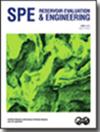碳酸盐岩原位燃烧后储层物性变化
IF 1.5
4区 工程技术
Q3 ENERGY & FUELS
引用次数: 1
摘要
本文总结了碳酸盐稠油岩心原位燃烧(ISC)实验的实验室模拟工作。孔隙度、渗透率、流体饱和度、热量和地球化学性质是决定燃烧技术性能的关键特征。在此,我们报告了热暴露引起的岩石样品储层性质、孔隙结构和矿物组成的变化,并通过一套标准和先进的实验技术进行了记录。大多数燃烧试验都是在破碎的岩心堆上进行的,这并不能准确地反映储层的性质。在本文中,我们给出了三个燃烧管试验的结果(经典ISC和连续热水处理ISC)涉及实际的现场岩心样品。气体孔隙度测量、核磁共振(NMR)和微计算机断层扫描(μCT)显示,总孔隙度和孔径分布增加,可以在纳米和微观水平上观察多孔岩心结构的变化。x射线衍射(XRD)和扫描电镜(SEM)分析了白云岩分解后矿物组成和岩性结构的变化;岩石热解和元素分析证实了岩石基质的变化。光学扫描记录了样品的热导率变化,这对燃烧过程的数值模拟具有重要意义。在评价ISC技术在富含白云岩的碳酸盐储层中的应用的框架下,所提出的岩心分析证明了其在提供稠油碳酸盐储层岩心的完整岩石物理描述方面的有效性,并展示了岩石对ISC技术的不同反应。本文章由计算机程序翻译,如有差异,请以英文原文为准。
Reservoir Properties Alteration in Carbonate Rocks after In-Situ Combustion
This study summarizes the work conducted as a part of laboratory modeling of in-situ combustion (ISC) experiments on cores from carbonate heavy oil fields. Porosity, permeability, fluid saturation, thermal, and geochemical properties are crucial characteristics of the target field defining the performance of the combustion technology. Here, we report the changes in reservoir properties, porous structure, and mineral composition of the rock samples induced by the thermal exposure and registered by a set of standard and advanced experimental techniques. Most combustion tests are conducted on the crushed core pack, which does not accurately represent the reservoir properties. In this paper, we present the results of three combustion tube tests (classic ISC and consecutive hot-water treatment ISC) involving actual field core samples. Gas porosimetry, nuclear magnetic resonance (NMR), and microcomputed tomography (μCT) revealed an increase in total porosity and pore size distribution and enabled visualizing the changes in the porous core structure at nano- and microlevels. X-ray diffraction (XRD) and scanning electron microscopy (SEM) demonstrated the change in mineral composition and lithological texture as a result of dolomite decomposition; Rock-Eval pyrolysis and elemental analysis were utilized to confirm the changes in the rock matrix. Optical scanning registered the changes in thermal conductivity (TC) of samples, which is important for numerical modeling of the combustion process. The proposed core analysis has proved its efficiency in providing a complete petrophysical description of the core of a heavy oil carbonate reservoir in the framework of evaluation of the ISC application for dolomite-rich carbonates and demonstrated the different responses of rock to the ISC technology.
求助全文
通过发布文献求助,成功后即可免费获取论文全文。
去求助
来源期刊
CiteScore
5.30
自引率
0.00%
发文量
68
审稿时长
12 months
期刊介绍:
Covers the application of a wide range of topics, including reservoir characterization, geology and geophysics, core analysis, well logging, well testing, reservoir management, enhanced oil recovery, fluid mechanics, performance prediction, reservoir simulation, digital energy, uncertainty/risk assessment, information management, resource and reserve evaluation, portfolio/asset management, project valuation, and petroleum economics.

 求助内容:
求助内容: 应助结果提醒方式:
应助结果提醒方式:


